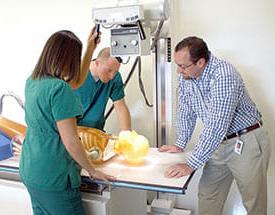Radiography
Radiography is an allied health career that examines patients using radiation, ultrasound or magnetic fields. Radiographers, also referred to radiologic technologists, produce X-rays and use other imaging techniques such as CT and MRI, essential in diagnosing medical problems. They position patients for procedures, operate high-tech equipment, explain procedures and guard against unnecessary exposure to radiation. Radiography has changed rapidly; gone are the days of film, chemicals and dark rooms, today’s radiography is done with digital imaging.

Jackson College Offers the following program options:
Radiography at Jackson College
Get Started
An associate degree and certification is necessary to become a radiographer. Radiography at JC is a second-admit program, which means students must submit an application after completing the prerequisite courses. Admission to the program is competitive and based on a points system. A clinical practicum experience is included in program requirements. Upon successful completion, students are eligible to write the American Registry of Radiological Technologists (ARRT) exams. Satisfactory completion of the ARRT board certifying exams allows the radiographer to use the initials of R.T. (R), Registered Technologist (Radiography).
Job Opportunities
Radiographers work primarily in hospitals, while some may work in physician’s offices, medical laboratories and outpatient care centers.
Pay
The median pay for radiographers and radiologic technologists is $61,370 per year.
Career Outlook
The Occupational Outlook Handbook from the Bureau of Labor Statistics projects 9% percent job growth through 2030.

